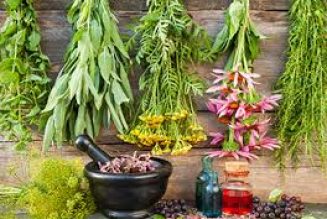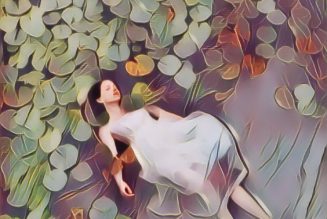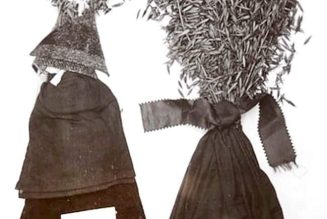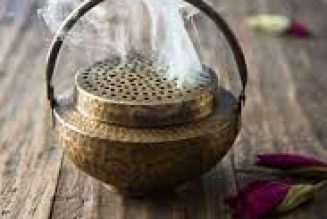All herbs and plants are magic: they are the pure embodiments of the Earth’s spirit, sustaining themselves with sunlight, vibration, water, and stardust (minerals). Herbs and plants feed us, nourish us, and heal us. Indivisibly, they are a necessary and integral part of our magical and spiritual lives as well.
There are certain herbs that, after thousands of years of ancestral practice, seem to possess an innately powerful connection to magic. In every culture and in each climate and terrain, there are huge pharmacopoeias of many different herbs with many different uses, all of them valuable and valid.
This piece is written from a perspective that is primarily Western and European in knowledge of history. While the following herbs may not have been used in your ancestral culture (though you may be surprised!), there are many herbs that were, and most likely still are. If this aspect is important to you, I urge you to do some digging, as there is one amazing commonality when it comes to herbs—at one point in time, every culture used plant medicine to survive; every culture used herbs in worship and ritual. How magical is that?
Mugwort, Artemisia vulgaris
Mugwort is perhaps one of the most popular herbs for use in modern day, Western magic. A resilient and abundant herb native to Europe and Asia, Mugwort is now naturalized throughout most of the world and can be found growing from New York to California, on beaches and through the cracked pavement of city streets. Mugwort and all Artemisias are associated with the Moon, and are considered to be feminine by nature. In Greek and Roman mythology, Mugwort is related to the goddesses Artemis (it’s namesake), Diana, and Hecate.
A go-to herb for astral projection and lucid dreaming, dried Mugwort is often made into dream sachets (also believed to have protective qualities) or smoked, or burned like incense just before sleeping. Herbalist Judith Berger says, “Mugwort opens up chambers of ancient memory within the brain, bringing to one’s dream life stirring visions of past and future that overflow with magical imagery…” Mugwort seems to unblock the divide between waking life and the dream world, which isthe magic world; a place where we all exist, even if forgotten or unrecognizable to us. Smoke or water made from Mugwort can be used to cleanse magical instruments before and after ritual. Medicinally, Mugwort is a very bitter herb with antispasmodic action; it is used topically with great success in cases of muscular (especially menstrual) cramping and is an integral part of acupuncture, in which it is often burned at certain bodily points—referred to as Moxa or Moxabustion.
Elder, Sambucus spp.
Elder grows on every continent but Antartica, and has been lovingly used by disparate cultures for many of the same ailments. Every culture with documented use of Elder agrees on this too—it’s exceptionally magic. In many European pagan traditions, Elder magic was regarded as that of the “Guardian of the Gateway” between the magical and the mundane, between life and death, light and darkness—a place where opposites meet. Its branches were often hung at the doorways of dwellings for protection; likewise, a hedgerow of Elder along a perimeter of land will not let invasive weeds past it. It is one of the first blooms of the season, in early Spring, with beautiful, cloud-like white flowers; it’s one of the last to fruit, too, in autumn when it produces copious deep, dark purple berries. The branches of the Elder are pliable, and the cork-like center can be pushed out easily, thus making it ideal wood for flutes and wind instruments as well as wands.
The most powerful wand in the world, according to legend and not just the Harry Potter series, is a wand made of Elder. There are claims based on Biblical writings that Judas Iscariot hung himself on an Elder and that the crucifix Jesus hung on was made of Elder. Little people and faeries are thought to dwell in the Elder and an old woman, sometimes called the Elder Mother, is thought to be the spirit of the tree. Like Mugwort, Elder is considered feminine in nature and said to induce lucid dreams, often of the faery world. Medicinally, both Elderberry and Elderflower are potent antivirals used as remedies for influenza and respiratory illness.
Vervain, Verbena officinalis
Used in ritual by the ancient Druids, this extremely bitter herb is beautiful to behold, with clusters of blue-purple flowers on tall, leafless stalks. Vervain is native to Europe while its cousin, Blue Vervain, Verbena hastata, is native to North America and is more commonly used in herbal medicine. Druids used Vervain for divination, consecration, and the ritual cleansing of sacred spaces; it is said that they harvested Vervain in August during the dark moon, when only Sirius the Dog Star is visible in the night sky. Vervain is also said to inspire poets and aid them in their work, and bards would often drink Vervain before performances or soliloquies.
Vervain is also said to be connected to the underworld, and taking a drink of Verain in wine on Samhain (Oct 31st) can open up contact with the dearly departed. In Ireland and the British Isles, Vervain was burned in ritual fires to protect crops and livestock on Beltane (May 1st). During the Summer Solstice (Jun 21st) celebrations, it was scattered over fields and gardens to ensure fertile growth. Roman soldiers also considered it to have protectant properties and carried Vervain with them into battle, and their messengers wore a protective wreath of Vervain as a sign of truce and truth. Likewise, Druidic and old Pagan traditions burned Vervain, sprinkled Vervain tea, or hung the dry herb in dwellings to keep out evil, and sometimes the dried stalks were used as wands for spell work. Medicinally, Vervain helps to clear out build ups such as kidney stones; it’s a bitter antispasmodic herb, so it’s great for cramping and tension as well as having antiseptic properties which make it suitable for cleaning wounds.
Bay Laurel, Laurus nobilis
This tree-like herb is native to Asia and the Mediterranean, but you might have some in your spice cabinet, as it’s sold in stores worldwide today for use as a seasoning in soups and sauces. In Greek mythology, Bay Laurels are said to be the embodiment of Daphne, a nymph who fled from Apollo’s unwanted advances and became a Bay tree to evade him; the Bay is now said to be sacred to Apollo. At The Oracle of Delphi, Bay leaves were smoked and chewed to promote fortune telling and prophecy. Additionally, Bay leaves were made into wreaths to crown victors and distinguished folk in ancient Roman and Greek cultures; triumphant athletes of the Pythic and Olympic games were crowned with laurel as well as the Poet Laureate and Baccalaureate— the term “laureate” comes from Bay Laurel.
Bay is believed to have protective qualities, and was worn to prevent lightning strike and by ancient doctors as it was considered a panacea. Bay is a wonderful herb to use for purification, and it is said water can be sanctified by extinguishing a burning Bay leaf in it. Bay has also traditionally been used in banishing spells, and it is recommended to burn after a negative person has left your home to ensure they never return, or after an illness. Writing a wish on a Bay leaf, then burning it, is said to guarantee the wish comes true. Medicinally, Bay is antifungal and antibacterial; a tea can be made of the berries and leaves and consumed for internal infection or applied topically. The tea is also said to be calming and somewhat pain relieving. Bay is especially useful for urinary and uterine issues when added to a bath.
Clove, Syzygium aromaticum
Another staple in the spice rack, Clove is a very well known herb in the modern world. Native to Indonesia, India, and the Middle East, Cloves as we know them are dried flower buds harvested from a tropical evergreen tree. At one time, Clove was among the most sought after spices in the world, with the Dutch attempting unsuccessfully to monopolize the trade. In magical use, Cloves are considered masculine by nature and are ruled by the planet Jupiter. Thus, they are associated with binging good luck, fortune, and prosperity to whomever carries them—they are a favorite talisman of gamblers and betting folk, who may make money drawing sachets with Clove to wear. Exchanging Cloves with friends is said to keep the bonds of friendship strong, and having Cloves present during a social gathering is said to promote kinship and harmony. Cloves can be used in ritual work to energize a spell or to further one’s psychic abilities.
Cloves are also considered to be an aphrodisiac, and can be used in love or attraction spells. Burning Cloves can have drawing properties, too, but the smoke will also stop malicious rumors and gossip about you from spreading, and mixed with tobacco, they make a sweet-smelling smoke which is also considered to be good luck. Medicinally, Cloves are very potently antimicrobial and are effective against viruses, infection, and influenza. They are also a wonderful digestive aid, powerful against toothaches, and somewhat numbing when applied to the skin.







